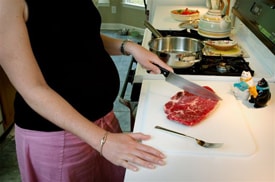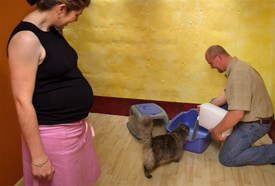Epidemiology & Risk Factors
Toxoplasmosis is not passed from person-to-person, except in instances of mother-to-child (congenital) transmission and blood transfusion or organ transplantation. People typically become infected by three principal routes of transmission.

Always cook meat thoroughly and use clean knives, utensils and cutting boards on all foods. (CDC Photo)
Foodborne transmission
The tissue form of the parasite (a microscopic cyst consisting of bradyzoites) can be transmitted to humans by food. People become infected by:
- Eating undercooked, contaminated meat (especially pork, lamb, and venison)
- Accidental ingestion of undercooked, contaminated meat after handling it and not washing hands thoroughly (Toxoplasma cannot be absorbed through intact skin)
- Eating food that was contaminated by knives, utensils, cutting boards, or other foods that had contact with raw, contaminated meat
Animal-to-human (zoonotic) transmission
Cats play an important role in the spread of toxoplasmosis. They become infected by eating infected rodents, birds, or other small animals. The parasite is then passed in the cat's feces in an oocyst form, which is microscopic.
Kittens and cats can shed millions of oocysts in their feces for as long as 3 weeks after infection. Mature cats are less likely to shed Toxoplasma if they have been previously infected. A Toxoplasma-infected cat that is shedding the parasite in its feces contaminates the litter box. If the cat is allowed outside, it can contaminate the soil or water in the environment as well.

Have someone else clean the litter box. (CDC Photo)
People can accidentally swallow the oocyst form of the parasite. People can be infected by:
- Accidental ingestion of oocysts after cleaning a cat's litter box when the cat has shedToxoplasma in its feces
- Accidental ingestion of oocysts after touching or ingesting anything that has come into contact with a cat's feces that contain Toxoplasma
- Accidental ingestion of oocysts in contaminated soil (e.g., not washing hands after gardening or eating unwashed fruits or vegetables from a garden)
- Drinking water contaminated with the Toxoplasma parasite
Mother-to-child (congenital) transmission
A woman who is newly infected with Toxoplasma during pregnancy can pass the infection to her unborn child (congenital infection). The woman may not have symptoms, but there can be severe consequences for the unborn child, such as diseases of the nervous system and eyes.
Rare instances of transmission
Organ transplant recipients can become infected by receiving an organ from a Toxoplasma-positive donor. Rarely, people can also become infected by receiving infected blood via transfusion. Laboratory workers who handle infected blood can also acquire infection through accidental inoculation.








No comments:
Post a Comment